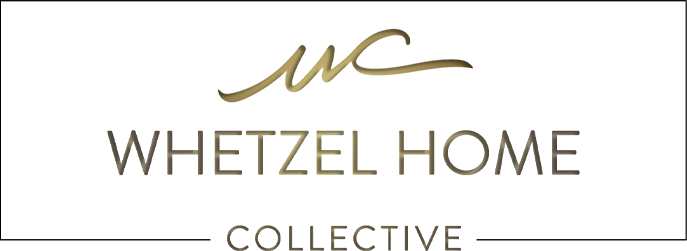Buying a foreclosed home can be tough, but it’s a chance to find affordable real estate. It’s important to know how to navigate foreclosure listings. These homes offer unique investment chances for those who look beyond the usual paths.
Foreclosures happen when owners can’t pay their mortgages. These homes might be a good deal, but they come with their own set of challenges. You need to plan carefully and think strategically.
In 2025, the foreclosure market is ripe with opportunities. With 32 states allowing nonjudicial foreclosures, you can find properties at lower prices. Knowing your way around foreclosure listings is key to making smart choices.
Key Takeaways
- Foreclosed homes can provide substantial savings compared to traditional real estate purchases
- Thorough research and due diligence are critical when exploring foreclosure opportunities
- Different states have varying foreclosure processes and legal requirements
- Financial preparation is essential for successfully purchasing a foreclosed property
- Professional guidance can help navigate the challenges of the foreclosure market
Understanding Foreclosed Properties in Today’s Market
The real estate world is always changing. Foreclosed properties are now great chances for smart buyers. Recent studies show us what’s happening with distressed properties in the U.S.
Current Foreclosure Statistics and Trends
Foreclosure activity has changed a lot because of the pandemic. ATTOM’s data shows over 320,000 foreclosure filings in 2024. This big change in the market means there are new chances for buying distressed properties.
- Foreclosed homes usually sell for 10-30% less than market value
- Lenders want to sell these properties fast
- Cash buyers have an edge in these deals
Impact of Post-Pandemic Market Changes
The post-pandemic world has changed how foreclosures work. Many homeowners who got help from the government now face foreclosure. This is because that help is no longer available.
“Understanding the nuanced foreclosure market is key to successful real estate investing in 2025.”
Market Outlook for 2025
Investors should look forward to a lively market with more chances in foreclosed properties. With careful research, planning, and help from experts, you can face challenges head-on.
Things to think about for buyers include:
- Doing detailed property checks
- Looking into local market trends
- Figuring out renovation costs
- Exploring financing options
Smart investors see the value in foreclosed properties. They do their homework and plan carefully.
What Makes Foreclosed Homes Different from Traditional Sales
Foreclosure auctions and bank-owned homes offer special chances for buyers looking for different ways to buy property. They stand out from regular real estate deals in many ways.
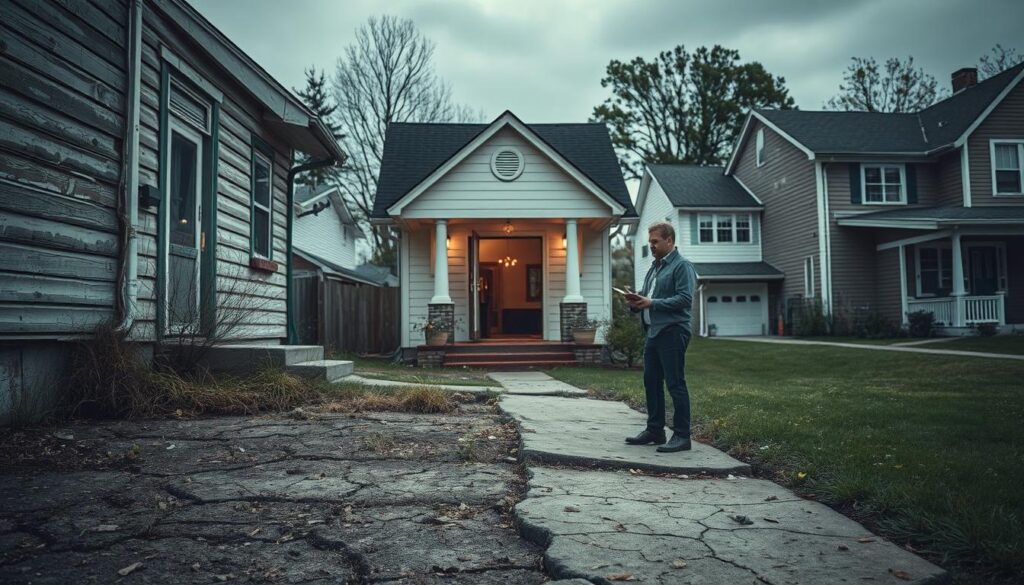
The main difference is in price and condition. Foreclosed homes usually sell for 10-30% below market value. This makes them a great choice for those watching their budget. Both investors and first-time buyers can find good deals here.
- Properties are often sold as-is, needing a lot of repairs
- Little info on property history and inspections
- High competition at foreclosure auctions
- Chance to build equity fast
Buying bank-owned homes comes with its own set of challenges. About 70% of these homes need major repairs. Cash buyers often have an edge because these deals move fast and require a big upfront payment.
Foreclosure properties are a complex but rewarding real estate chance for ready buyers.
The buying process is very different from regular sales. Buyers need to:
- Do detailed title searches
- Get ready for extra renovation costs
- Deal with the complex auction or bank sale process
- Know the foreclosure laws in their state
Knowing these differences helps buyers make smart choices when looking at foreclosure auctions and bank-owned homes. It’s a chance to invest in real estate in a unique way.
Types of Foreclosure Properties Available
Exploring the foreclosure market means knowing the different types of distressed properties. Investors and homebuyers can find various options to buy real estate at lower prices.
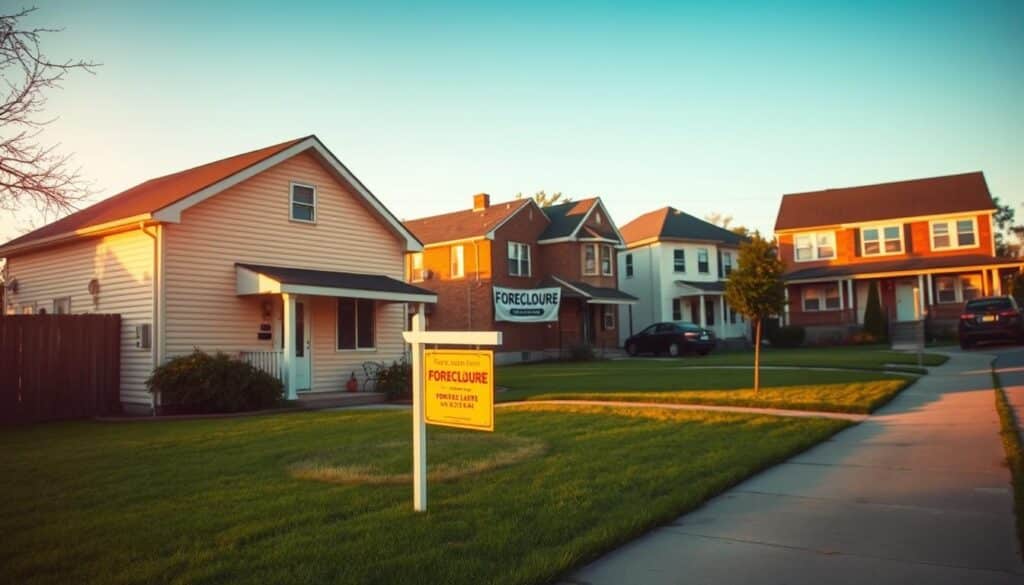
The foreclosure market offers many paths for buyers. Each path has its own features and buying process. About 40% of foreclosures go to investors, showing the market’s depth and chance for profit.
Pre-foreclosure Homes: Early Opportunity
Pre-foreclosure homes are a key part of the property distress cycle. These homes belong to borrowers who can’t pay their mortgages but haven’t lost them yet. Key points include:
- Potential for negotiation directly with homeowners
- Opportunity to help homeowners avoid complete credit destruction
- Prices typically 10-20% below market value
Bank-Owned (REO) Properties: Direct Acquisition
REO properties are homes taken by banks after failed foreclosure auctions. They offer several benefits:
- Clean title with no outstanding liens
- Potential for significant discounts
- Typically require more extensive repairs (up to 30% may need significant work)
Short Sale Properties: Lender-Approved Negotiations
Short sales happen when borrowers owe more than the property’s value. Lenders agree to accept less than the total mortgage balance. Key features include:
- Complex approval process
- Can take up to 90 days for bank response
- Potential for substantial savings
Government-Owned Foreclosures
Government agencies like HUD, VA, and Fannie Mae offer foreclosed properties with special financing options. The HomePath ReadyBuyer program, for example, helps first-time homebuyers with up to 3% in closing cost assistance.
“Understanding these foreclosure types can unlock significant investment opportunities for savvy buyers.” – Real Estate Investment Expert
Buyers should research each foreclosure type carefully and seek professional advice. The right approach can turn a distressed property into a valuable investment.
How to Buy a Foreclosed Home: Step-by-Step Process
Buying a foreclosed home is a great chance to get a good deal. It’s a smart move for those who know how to navigate the process.
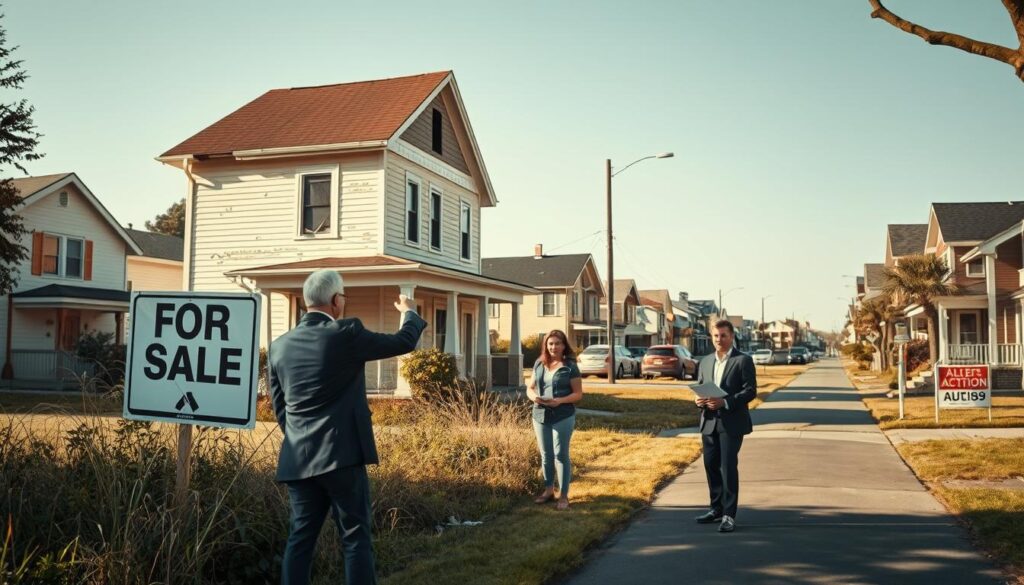
Before you start, it’s important to know the key steps to get a foreclosed property:
- Financial Preparation
- Check your credit score
- Get pre-approved for a loan
- Plan for repair costs
- Research and Property Selection
- Look into local foreclosure markets
- Find properties you like
- Check the area’s value
- Professional Support
- Find a real estate agent who knows foreclosures
- Think about hiring a real estate lawyer
“Foreclosed homes can offer substantial savings, but require careful due diligence.” – Real Estate Investment Experts
There are different ways to finance a foreclosed home. You can use regular loans, FHA 203(k) loans, or special programs like Fannie Mae HomePath. Be ready for challenges like properties sold “as is” and unexpected repair costs.
Property auctions can be very competitive. Only about 30% of foreclosed homes are bought by first-time buyers. Being well-prepared is key. Cash buyers or those with strong financing have an edge.
For a successful foreclosure purchase, consider these:
- Do a full property inspection
- Do a thorough title search
- Plan for renovation costs
- Know the local foreclosure laws
With the right research and planning, buying a foreclosed home can be a smart move. It’s a great way to start or grow your real estate portfolio.
Finding and Working with Specialized Real Estate Agents
Real estate investing can be complex, and foreclosure listings add another layer. The right real estate agent is key to your success.

Real estate agents with special certifications know the foreclosure market well. They help buyers understand the challenges of distressed properties.
Importance of Professional Certifications
When looking for a real estate agent, check for specific certifications. These show they know foreclosure transactions:
- Certified Distressed Property Expert (CDPE)
- Short Sales and Foreclosure Resource (SFR) certification
- Additional real estate investing credentials
Key Qualities of a Foreclosure Expert
Not all real estate agents are the same when it comes to foreclosure listings. Look for these important qualities:
| Characteristic | Importance |
|---|---|
| Market Knowledge | Deep understanding of local foreclosure trends |
| Negotiation Skills | Ability to navigate complex bank negotiations |
| Network Connections | Access to exclusive foreclosure opportunities |
Experienced agents with specialized training can spot undervalued properties. They help investors avoid costly mistakes. Their knowledge can save thousands in real estate investing.
Securing Financing for Foreclosed Properties

Buying distressed properties needs careful planning and knowing about special mortgage options. Investing in foreclosed homes requires a different financing approach than regular home buying.
Getting preapproved for a mortgage is a key first step. Lenders check your financial health by looking at:
- Credit score
- Income verification
- Debt-to-income ratio
- Cash reserves
There are several financing options for buying foreclosed properties:
- Conventional Mortgages: Standard loans for properties in good shape
- FHA 203(k) Renovation Loans: Loans that cover purchase and repair costs
- Government-Backed Loans: VA and USDA programs for certain buyers
The FHA 203(k) loan is great for buying distressed properties. It lets investors finance the property and needed repairs in one loan. The streamlined version allows up to $35,000 for simple home improvements.
Cash offers are often the best choice in foreclosure markets, giving buyers a big advantage.
Investors should think about extra financial needs. Many foreclosed homes need a lot of repairs. Lenders want to see you’re financially stable. A good credit score and cash on hand can help a lot in getting financing for these investments.
Where to Find Foreclosure Listings
Finding bank-owned homes and foreclosure listings needs smart searching. Real estate investors and buyers have many reliable sources. These help find properties at good prices.
Online Resources and Databases
Online platforms have changed how we find foreclosure listings. Many websites have big databases of distressed properties:
- RealtyTrac – gives detailed foreclosure info for a monthly fee
- Foreclosure.com – has lots of listings across the country
- Zillow’s foreclosure section – easy to use for finding bank-owned homes
- Auction.com – lists properties in different foreclosure stages
Bank Websites and Government Portals
Many official sites offer direct access to foreclosure listings:
- Bank of America foreclosure website
- Fannie Mae HomePath portal
- Department of Housing and Urban Development (HUD) listings
- USDA Rural Development property database
“The key to finding great foreclosure deals is casting a wide net across multiple platforms.” – Real Estate Investment Expert
Local MLS Listings
Local Multiple Listing Services (MLS) are key for finding foreclosures. Working with a real estate agent who knows foreclosures is helpful. They can show you the latest bank-owned homes in places like Las Vegas, Houston, Miami, Sacramento, and Atlanta.
Popular places for foreclosures include Denver, Philadelphia, Phoenix, and San Diego. A certified agent can help you through these complex listings.
Making Competitive Offers on Foreclosed Properties
Learning how to buy a foreclosed home requires strategic planning. The foreclosure market is fast-paced. Most bank-owned properties get several offers within days of listing.
Successful bidders know key strategies for making strong offers:
- Get pre-approved financing before bidding
- Research recent comparable sales in the neighborhood
- Prepare to act fast in high-demand markets
- Minimize contingencies to strengthen your proposal
Banks look at several factors when evaluating offers. Financing readiness can greatly improve your chances. Investors with mortgage pre-approval are 50% more likely to have their offers accepted.
When bidding on foreclosed properties, consider these important tactics:
- Conduct thorough comparative market analysis
- Factor in possible repair costs (average $15,000 for “as-is” properties)
- Be ready for negotiations
- Use escalation clauses in competitive bidding
Foreclosure auctions often have 5-10 bidders, making it competitive. Knowing the local market and being financially ready can help you win your desired property.
Understanding the “As-Is” Nature of Foreclosures
Buying distressed properties comes with unique challenges. Foreclosed homes are sold as they are, so buyers must be ready for surprises. They need to understand the hidden challenges.
Foreclosures are sold “as-is,” which means no warranties. This means buyers must handle all repairs and maintenance themselves. It’s a big responsibility.
Common Property Conditions
Foreclosed homes often have certain issues:
- Significant deferred maintenance
- Potential structural damage
- Outdated electrical or plumbing systems
- Possible vandalism or neglect
- Unresolved pest infestations
Hidden Costs and Repairs
When buying at foreclosure auctions, budgeting is key. Unexpected repair costs can quickly turn a good deal into a financial burden.
“In foreclosure sales, what you see is exactly what you get — no promises, no guarantees.” – Real Estate Investment Expert
Hidden expenses might include:
- Extensive renovation requirements
- Structural repair costs
- Code compliance updates
- Potential environmental remediation
- Outstanding property taxes or liens
To succeed in buying distressed properties, do your homework. Get professional inspections and have a budget for repairs.
Navigating the Inspection and Appraisal Process
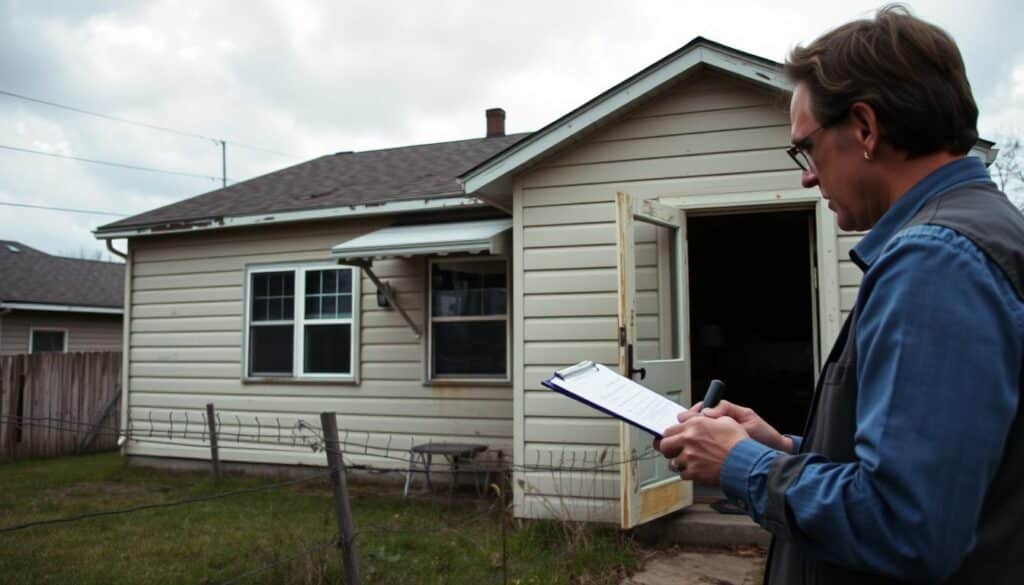
Learning how to buy a foreclosed home is key for real estate success. Foreclosed properties need extra checks to protect your money. This is different from buying a regular home.
Inspections of foreclosed homes show important details about their state. Sadly, 80% of buyers skip home inspections. This can lead to big repair costs, often between $15,000 to $50,000.
“A thorough inspection is your financial shield in real estate investing.” – Real Estate Experts
Key Inspection Considerations
- Check for structural damage
- Assess electrical and plumbing systems
- Evaluate possible mold or water damage
- Inspect roof and foundation integrity
Professional inspectors find hidden problems that you might not see. They give detailed reports. These reports show what repairs might be needed. This helps you make smart choices in real estate.
Appraisal Insights
| Appraisal Factor | Impact on Value |
|---|---|
| Property Condition | Significant Reduction |
| Comparable Sales | Primary Valuation Method |
| Repair Costs | Directly Affects Pricing |
When buying a foreclosed home, 70% are sold “as-is”. This means you’ll have to plan for repairs and updates. A good inspection helps you guess these costs. It also helps you get a fair price for the home.
Real estate pros say getting a detailed inspection report is vital. It can save you thousands in repair costs. It also helps avoid financial problems in your investing journey.
Legal Considerations and Title Issues

Buying distressed properties involves many legal steps. Real estate investing means knowing about title problems that can affect ownership. It’s key to understand these issues well.
Investors in foreclosed properties face legal hurdles not seen in regular sales. These deals need deep research and expert advice.
Title Search Requirements
A detailed title search is essential in real estate. It checks public records for legal issues:
- Identifying existing mortgages
- Discovering possible liens
- Verifying property descriptions
- Checking for unpaid taxes
Dealing with Liens and Encumbrances
Foreclosed properties often have legal issues. Buyers must deal with different types of problems:
- Property Tax Liens: Unpaid taxes can cause big legal problems
- Mechanics Liens: Unpaid contractor bills can cloud titles
- Judgment Liens: Legal judgments against previous owners can affect ownership
Getting legal help is vital to solve these issues. Investors should plan for title insurance and professional checks to avoid risks.
Professional help can guide through the legal maze of foreclosure purchases, safeguarding your investment.
Knowing Florida’s laws, like the right of redemption, can avoid future problems. Always talk to real estate lawyers who know foreclosure deals well. This ensures a legal and smooth purchase.
Renovation Loans and Financing Options
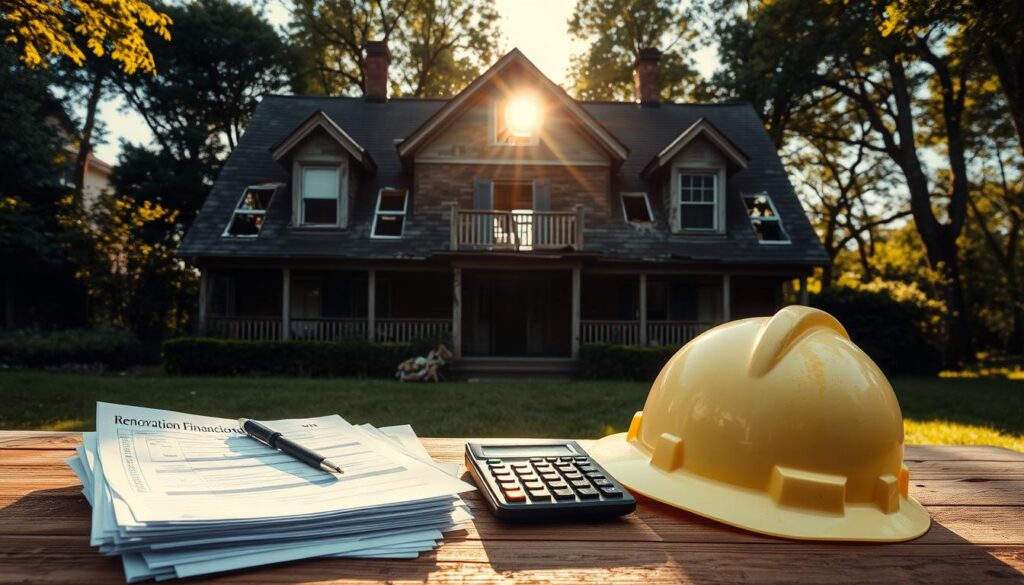
Investing in real estate with distressed properties needs smart financial planning. This is true for foreclosed homes that often need a lot of work. Buyers have many financing options to turn these properties into good investments.
The FHA 203(k) loan is a top pick for buying distressed properties. It lets investors finance both the home purchase and renovation costs in one loan. This makes it easier to fix up foreclosed homes.
- FHA 203(k) Limited Loan: Covers minor improvements up to $35,000
- FHA 203(k) Standard Loan: Supports major structural renovations
- Minimum down payment: 3.5% with a credit score of 580 or higher
Other financing options for real estate investing include:
- Fannie Mae HomeStyle Renovation Mortgage
(Minimum 3% down, 620 credit score) - Freddie Mac CHOICERenovation Loan
(Supports up to 15% of home’s purchase price for renovations) - Home Equity Lines of Credit (HELOCs)
(Can extend credit up to 85% of home equity)
Investors should figure out the total costs of the project. This includes the home’s price and the cost of repairs. It’s wise to have a 10-20% extra for unexpected repairs. Getting a professional home inspection is key to knowing what repairs are needed before you finance.
Dealing with Occupied Foreclosures
Buying distressed properties can be tricky when people are living in them. Foreclosure auctions bring special challenges for buyers. It’s key to know how to handle occupied foreclosures to buy them successfully.
Statistics show some interesting facts about occupied foreclosures:
- 30% of owner-occupant buyers are willing to purchase occupied properties
- 35% of owner-occupant buyers offer current occupants a graceful exit strategy
- 52% of local community developers are open to occupied property purchases
When dealing with occupied foreclosures, buyers have a few options:
- Cash-for-Keys Agreement: Negotiate financial compensation for voluntary relocation
- Legal Eviction Process: Follow strict legal protocols for property possession
- Tenant Rights Consideration: Understand local and federal tenant protection laws
| Buyer Type | Occupied Property Interest | Graceful Exit Offer |
|---|---|---|
| Owner-Occupant Buyers | 30% | 35% |
| Local Community Developers | 52% | 78% |
Handling occupied foreclosures well needs patience, legal knowledge, and smart talks. Buyers should get ready for possible issues and talk kindly with the people living there.
Timeline and Expected Closing Process
Learning how to buy a foreclosed home is key for real estate investing success. The closing process for foreclosed properties is different and can be complex. It takes longer than buying a traditional home.
Foreclosure deals often face unique challenges. This can make the closing process longer. Buyers should expect a timeline of 3 to 12 months. This depends on the property type and specific situations.
Documentation Requirements
Buying a foreclosed home needs detailed documents. Buyers must gather several important papers:
- Mortgage pre-approval letter
- Proof of funds for cash purchases
- Detailed property inspection reports
- Title search documentation
- Comprehensive financial statements
Potential Closing Delays
Investing in foreclosed properties requires patience. Several things can affect the closing timeline:
| Delay Cause | Potential Impact |
|---|---|
| Title Issues | 30-60 days additional processing |
| Property Liens | Potential resolution time of 45-90 days |
| Occupancy Problems | Extended timeline by 2-4 weeks |
Buyers should stay flexible and keep in touch with their agent and lender. This is important during the process.
Pro tip: Always keep your financial documents up to date. Be ready for any unexpected issues during the foreclosure purchase journey.
Conclusion
Buying a foreclosed home is a unique chance in real estate that needs careful planning. It involves understanding the market, facing risks, and making smart choices. Investors should know that foreclosed homes can save 10-30% but need thorough research and expert advice.
Real estate investing through foreclosures requires a lot of preparation. Buyers should think about renovation costs, which can be $10,000 to $50,000. Also, about 50% of foreclosed homes need big repairs. Working with a real estate advisor can lower risks and help make better choices.
Whetzel Homes Collective in St. George, Utah, is ready to help with foreclosure opportunities. Our team offers detailed guidance for buying foreclosed properties. Call us at (435) 334-1544 to talk about investment strategies and get advice for your real estate goals.
Investing in foreclosed properties needs patience, hard work, and expert help. By knowing the market, being financially ready, and getting advice from pros, investors can turn foreclosure chances into great real estate assets.
